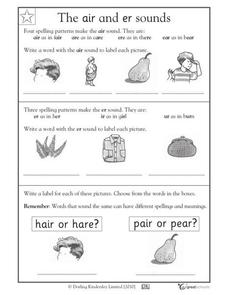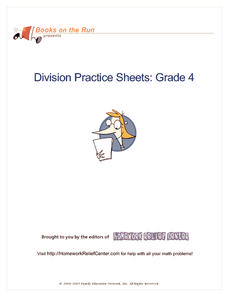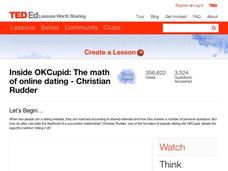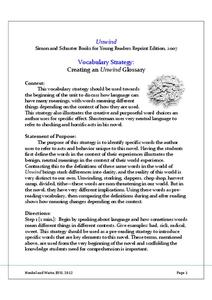Curated OER
Understanding and Using Root Words to Expand Vocabulary
Middle schoolers engage in a lesson plan which reminds them that root words indicate the base meaning of a word, and that those roots are found in many different words that have similar meanings. Pairs of pupils use construction paper...
Curated OER
Using Homographs
Not all homographs are the same! Actually, that's exactly what the definition means; the spelling is the same, but the meanings are different! Look at some common homographs with your class. Example words include: bow, desert, produce,...
Curated OER
Vowel Sounds: /air/ and /er/
All the best readers started out the same way. Build the foundational skills needed to recognize vowel sounds like /air/ and /er/. Early readers write a word to label each of nine images. Each image focuses on a different spelling...
Curated OER
Choose the Homograph
Practice homographs with this fun worksheet! Learners choose the meanings of ten homographs based on the sentence's context clues. The worksheet has a picture of bats - one flying mammal, and one used in baseball. Use this resource as a...
Curated OER
The ee and ie Sounds
Put to use the old saying, "When two vowels go a walking, the first one does the talking." Scholars focus on the /ee/ and /ie/ sounds and spelling patterns that create them. First, they label four pictures with the ea and ee spellings,...
National Endowment for the Humanities
In Emily Dickinson's Own Words: Letters and Poems
Analyze the depth and beauty of American Literature by reading Emily Dickinson's letters and poems. The class analyzes Dickinson's poetic style and discusses Thomas Wentworth Higginson's editorial relationship with Dickinson. They pay...
Charleston School District
Solving Systems by Inspection
Can you solve a system by just looking at it? The previous lessons in the series taught three methods of solving systems of equations. Now learners discover they can determine the number of solutions of a system just by looking at it....
Curated OER
Subtracting Suffixes
Take it off! Take what off? Take off the suffixes to create new words! Learners build vocabulary and spelling skills as they remove the suffixes from 20 different words. This activity can help learners begin to recognize roots, compound...
Florida Center for Reading Research
Vocabulary: Words in Context, Ask-Explain-List
Engage young readers in using context clues with this collaborative vocabulary activity. In pairs, children draw from a deck of cards, with each card asking a question about a context involving a specific vocabulary word. After...
US Institute of Peace
Perspectives on Peace
Much like a garden, once the seeds of peace are planted, they need to be tended! How can humankind make and keep peace? The second installment in a series of 15 peacebuilding activities focuses on different perceptions of peace. The...
University of North Carolina
Qualifiers
A lot of writers really struggle very much with adding a lot of qualifiers and intensifiers in their writing. Part of a larger series to improve writing skills, a handout on the topic provides tips to help reduce a reliance on these...
Curated OER
Butterfly, Butterfly: Teaching Vocabulary
Kindergarteners practice new words through listening to and reading the science book Butterfly by Jenny Feely. The teacher will first choose words that are essential for understanding the text. Then, using pictures in the text, pupils...
TED-Ed
Different Ways of Knowing
“Words have colors, emotions, numbers, shapes, and personalities.” Daniel Tammet welcomes viewers to his world with a 10-minutes video that illustrates how he, as an autistic savant, perceives the world. Class members are then asked to...
Curated OER
Homophone Hunt
What is a homophone? Review the definition with your class before sending them off for this independent activity. As they read the story, they search for any homophones used incorrectly.
101 Questions
Class Height Distribution
A picture is worth a thousand words, and this is no exception! The introductory photo shows a group of classmates lined up in height categories; females and males are in different colors, and the shape of the curve they create is...
Curated OER
Using Random Sampling to Draw Inferences
Emerging statisticians develop the ability to make inferences from sample data while also working on proportional relationships in general. Here, young learners examine samples for bias, and then use random samples to make inferences...
EngageNY
Chance Experiments with Outcomes That Are Not Equally Likely
The fifth portion of the 25-part series introduces probabilities calculated from outcomes that are not equally likely. Class members use tables to calculate probabilities of events, add outcome's probabilities, and find complements....
Family Education Network, Inc.
Division Practice Sheets: Grade 4
Expand on young mathematicians' prior knowledge of multiplication with this series of worksheets introducing the concept of division. Covering a wide range of topics from basic fact families and single-digit division to long division...
Curated OER
Commonly Misused Words
Affect or effect? Ensure, insure or assure? Here’s a presentation that focuses on commonly misused words that sound similar yet have different spelling and meanings. The homonyms are defined and then examples are presented. Consider...
Curated OER
Inside OKCupid: The Math of Online Dating
Capture the hearts of your young statisticians with this real-life example of using statistics in online dating. The use of average and geometric mean are discussed in the context of creating the algorithm used to connect people.
Math Guy
Algebra 1 Practice Final
What makes this resource special? The amazing answer key that comes with worked out solutions and notes for each problem. Practice problems include all topics ranging from linear systems to simplifying exponential expressions. The packet...
Curated OER
Unwind: Vocabulary Strategy, Creating an Unwind Glossary
Prior to reading Unwind, Neal Shusterman's 2007 young adult science fiction novel, class members research the common definition of words drawn from the novel that will come to have a very different meaning to them as they are drawn into...
Curated OER
The Amazing World of Dictionaries
Use this resource to discuss various ways to dictionaries can be used. What a terrific presentation to display when exploring how dictionaries are used to define words, check spellings, identify parts of speech, and more. The PowerPoint...
EngageNY
Presentation of Events: Comparing Two Authors
Give a little clue! Readers learn how context clues can help them determine the meaning of words by viewing a Context Clues Resource sheet then completing a Context Clues
practice sheet. They then compare events presented by two...

























